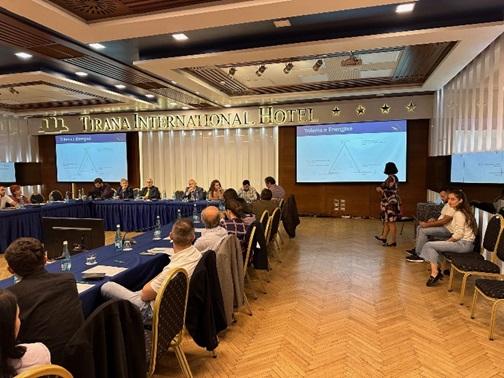Albania 2030: Towards 100% RES Production and Consumption
Albania has made significant efforts to align its policies with those of the European Union in the fields of energy and climate. Through recent initiatives, as well as the National Climate Change Strategy and the National Energy Strategy 2018-2030, the country has set ambitious goals to reduce greenhouse gas emissions and improve energy efficiency. Albania’s aim to cut CO₂ emissions by 11.5% by 2030 is part of its commitments under the Paris Agreement.
By 2030, Albania aspires to be a country that both consumes and produces renewable energy, thereby increasing the capacities of Renewable Energy Sources (RES) to 42% of total consumption. These efforts align with the objectives of the European Green Deal and initiatives like the REPowerEU program, which encourages EU member states and regional countries to cooperate to achieve the green energy transition.
A key aspect of achieving these objectives is the active involvement of communities and citizens in energy policies. Through its directives, the European Commission promotes collaboration among social actors and public participation in energy policies. For Albania, this means supporting energy communities, where citizens can participate not only as consumers but also as producers of energy from renewable sources.
On November 7, 2024, “Movement for Energy and Climate” (LEK), where Milieukontakt Albania is one of the members that initiated this movement, organized the National Meeting “Albania – 2030: 100% Renewable Energy Production and Consumption” at the Tirana International Hotel. This event aimed to bring together interested parties from the public and private sectors, NGOs, experts, academics, media, and diplomatic representatives, providing a platform to discuss strategies and challenges to achieving national energy goals.
In the discussions surrounding the energy transition, several key challenges and opportunities for Albania have been identified. On the one hand, the country still relies on fossil fuels for certain aspects of its energy, yet on the other, it has considerable potential for renewable energy development through financial and technical support from the EU and international organizations. One of the primary challenges remains the creation of open strategies for decarbonizing the industry and transport sectors, both of which have high energy consumption.
In her speech Valbona Mazreku, director of Milieukontakt Albania talked about the potential and positive contribution that people can make to energy efficiency, promoting energy potential through local energy management, local energy production, and Renewable Energy Communities (REC) in national and European level.
In the last years, national efforts have been made in Albania to sustain economic development and meet the commitments of EU standards and legislation as regards energy efficiency (EE) and renewable energy (RE) implementation. In such respect, RECs are for the first time mentioned in the Albanian Law for “Promoting the Use of Energy from Renewable Sources". Article 21 of the respective Law No. 24/2023 regulates RECs in terms of rights, structure, membership, tariffs, and control measures and entitles them to compliance with provisions of the REDII.
The main legislative gaps in Albania likely stem from the absence of specific legal frameworks for energy communities, complex bureaucratic processes, financial disincentives, and a lack of clear market participation rules. These gaps hinder the full implementation of decentralized renewable energy projects and prevent Albania from fully capitalizing on the potential of energy cooperatives, particularly in the photovoltaic sector. Addressing these issues with targeted reforms could make energy projects more accessible and appealing to communities, families, and small businesses.
The European examples and best practices can help to target public administrations, businesses, and citizens, to be adapted to regional contexts and specific policy needs.
During this meeting, the LEK movement promoted this platform for all NGOs, experts, and citizens who wish to contribute to Albania's vision for a sustainable energy future. By providing support for best practices, education, and public awareness, LEK aims to raise awareness and encourage concrete actions that will help Albania achieve its 2030 goals.
By joining efforts, Albania can become an excellent example of a country developing green energy to improve the well-being of its citizens and protect the environment.

